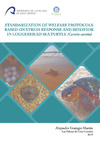Please use this identifier to cite or link to this item:
https://accedacris.ulpgc.es/jspui/handle/10553/76614
| Title: | Standarization Of Welfare Protocols Based On Stress Response And Behavior In Loggerhead Sea Turtle (Caretta Caretta) | Authors: | Usategui Martín, Alejandro | Director: | Montero Vítores, Daniel | UNESCO Clasification: | 310502 Piscicultura | Issue Date: | 2020 | Abstract: | Las tortugas marinas y los humanos llevan interactuando desde hace milenios. Esta interacción ha cambiado a lo largo de la historia. El consumo indiscriminado, junto con otras amenazas han provocado el declive de las poblaciones de tortugas marinas, han hecho que las siete especies de tortugas marinas existes hoy en día se consideren “en peligro de extinción”.
La situación en la que se encuentran las tortugas marinas a nivel global exige el desarrollo y la puesta en marcha de diferentes planes de conservación. Durante la aplicación estos planes; tanto “in situ”, centrados en la protección y conservación de los hábitats de nidificación, trabajando con hembras nidificantes, crías y huevos, como “ex situ”, los programas de “head starting” y reintroducción, junto con la recuperación de tortugas marinas, la interacción: humano – tortuga marina, es inevitable.
Observando esta interacción en conjunto, desde la incubación de los huevos hasta los estadios adultos, hay una falta generalizada de información sobre cómo la presencia, la interacción o la manipulación puede afectar al bienestar de estos reptiles en peligro de extinción. El objetivo de esta tesis doctoral es establecer y mejorar los protocolos estandarizados de manejo de tortuga boba (Caretta caretta), bajo condiciones controladas o en el medio natural en las diferentes etapas de su ciclo de vida, basados en indicadores de bienestar. Para conseguirlo, se han propuesto diferentes estudios para responder a una serie de objetivos específicos.
Determinar el efecto de la temperatura de incubación en el fenotipo y la actividad de las crías, mejorar los protocolos de manipulación de crías y juveniles de tortuga boba en condiciones controladas, así como estudiar la respuesta de corticosterona y su bienestar, en hembras nidificantes en las playas de Boas Vista (Cabo Verde). Sea turtles and humans have been sharing this planet for around 200 Ka and probably interactions between them have been occurred since the beginning, but the first register of this interaction dates from 5.000 BCE. Along human history sea turtles have been seen and used in many different ways. They have been considered as gods and viewed as a sign of fertility or longevity for many different cultures, but also have been seen, and consequently used, as a source of protein and raw material.Meanwhile, sea turtle use has evolved along the time, from a traditional used, hunting and exploiting them with traditional methods, to an enormous fishing industry, which almost collapsed several sea turtle populations around the world. The indiscriminate consumption, together with other factors that sea turtles needed to face during the last decades, such as marine litter, marine pollution, habitat destruction and climate change, have produced a general decline in their populations, and consequently the necessity to include all the seven existing sea turtle species in the consideration as endangered species.The worldwide situation of sea turtles makes necessary to launch and implement important conservation plans. “In situ” programs had been quickly implemented and are still running worldwide, mainly focused on protection and conservation of nesting habitats. For example, egg incubation is an important point to consider while carrying out conservation plans, since the incubation environment determine important phenotypic and performance characteristics of the hatchlings. |
Description: | Programa de Doctorado en Acuicultura Sostenible y Ecosistemas Marinos por la Universidad de Las Palmas de Gran Canaria | URI: | https://accedacris.ulpgc.es/handle/10553/76614 |
| Appears in Collections: | Tesis doctoral |
Page view(s) 5
155
checked on Jan 10, 2026
Download(s)
654
checked on Jan 10, 2026
Google ScholarTM
Check
Share
Export metadata
Items in accedaCRIS are protected by copyright, with all rights reserved, unless otherwise indicated.
